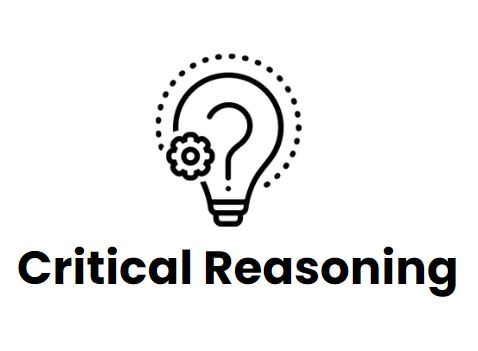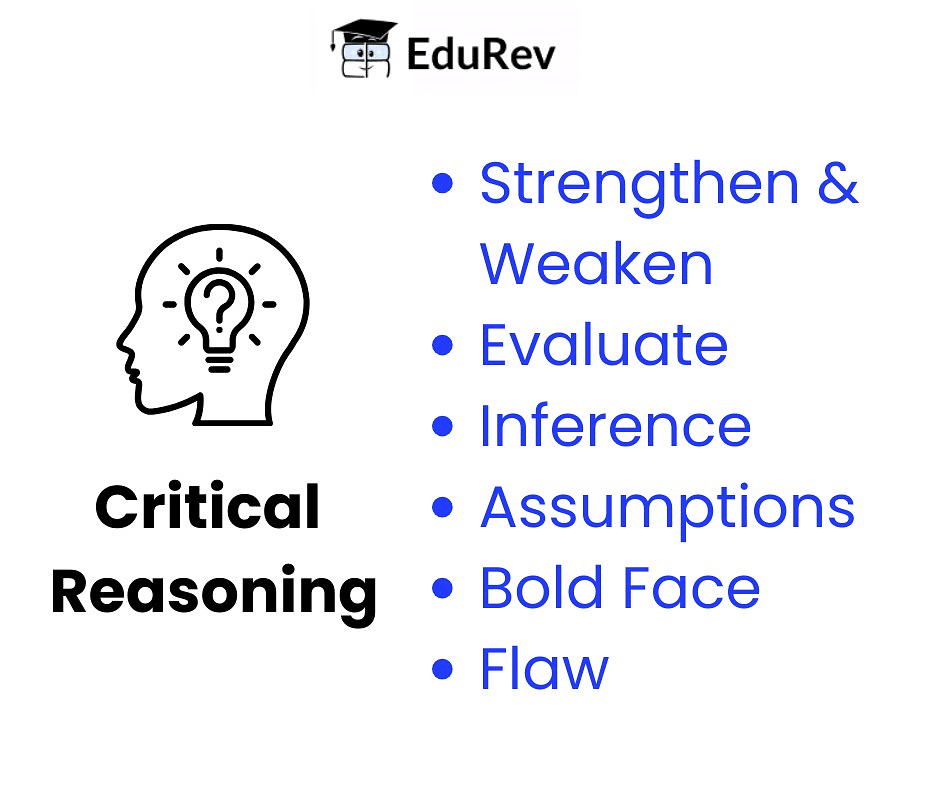Introduction to GMAT Critical Reasoning | Verbal for GMAT PDF Download
Critical Reasoning is a part of GMAT Verbal Reasoning that checks how well you think logically. It's about assessing your ability to analyze arguments. This question type looks at crucial business skills and evaluates specific logical qualities. For GMAT students, tackling Critical Reasoning involves breaking down arguments, spotting flaws in answer choices, understanding the reasoning behind the argument, and drawing a relevant conclusion based on the discussion. It's a way for test-takers to showcase their logical thinking skills.

GMAT Critical Reasoning Questions
The three types of GMAT Critical Reasoning Questions are:
The type 1 questions include strengthen, weaken, assumption, explain the paradox and useful to evaluate.
The type 2 questions are generally bold-faced reasoning questions.
The type 3 questions refer to the conclusion or interference questions.
Critical Reasoning Topics in Detail

Strengthen & Weaken: One common kind of CR question is the strengthening and weakening question. These questions present an argument, and then ask test-takers to identify the answer choice that, if true, would best strengthen or weaken that argument.
Evaluate: An evaluation of an argument assesses the strength and validity of the argument. It is an assessment to evaluate if the conclusion follows the premise logically or not.
Inference: In this phase, the candidates need to conclude logically or reasoned out accurately on the basis of the given passage.
Assumptions: The assumption questions enable the candidate to detect an assumption of the author. The author made the argument to claim a conclusion depending on the information of the argument.
Bold Face: In this Critical Thinking Logical Reasoning Question type, the candidates were given two statements in bold. The candidates need to detect the functions of the bold-faced statements discussed in the argument.
Flaw: This section asks the candidate to assess the statement of the passage. The candidate needs to find the logical flaw in the argument of the passage.
Tips to Solve GMAT Critical Reasoning
Tip #1 – Start by Reading the Question!
The first step in the GMAT Critical Reasoning strategy is to read the question stem before diving into the argument. Understand what type of question you're dealing with, and approach the argument with that question in mind. This helps you focus on what you need to find while reading the argument.
Tip #2 – Identify the Unstated Assumption
Once you figure out the argument's conclusion and premises, think about the underlying assumption holding the argument together. Our job is not to challenge the facts but to find that unstated assumption and question the gap between facts and conclusion. Ask yourself: What did the author need to be true for the conclusion to make sense?
Tip #3 – Know What You're Searching For
In Critical Reasoning, GMAT offers one correct answer and four tempting choices. Going into the question with a clear idea of what you're looking for is crucial. For certain question types, finding the assumption is powerful for strengthening or weakening the argument. For other types, understanding the structure of the argument or the information needed to evaluate the conclusion helps.
Tip #4: Read Exactly What's Written
Many mistakes in Critical Reasoning come from a common error: misreading the argument, question stem, or answer choices. Take your time, stay focused, and read exactly what's written without trying to paraphrase. Even a single word can change the meaning, so reading carefully and noting every detail helps avoid mistakes.
Tip #5: Look for Four Wrong Answers
Most Critical Reasoning questions have clearly incorrect choices. Focus on finding these low-hanging fruits and eliminate them in the first pass. By narrowing down the options, you can concentrate on the more challenging choices that require closer attention. The last remaining choice, no matter how confusing, has to be the correct answer.
Critical Reasoning questions test thinking skills and the ability to analyze arguments critically. They require attention to detail and aren't easily tackled with shortcuts. Follow these tips to understand what's being tested and master GMAT CR.
|
52 videos|55 docs|61 tests
|
FAQs on Introduction to GMAT Critical Reasoning - Verbal for GMAT
| 1. What is GMAT Critical Reasoning? |  |
| 2. How many questions are there in the GMAT Critical Reasoning section? |  |
| 3. What are some common question types in GMAT Critical Reasoning? |  |
| 4. How can I improve my performance in GMAT Critical Reasoning? |  |
| 5. Are there any specific tips to solve GMAT Critical Reasoning questions? |  |


















